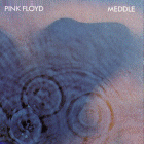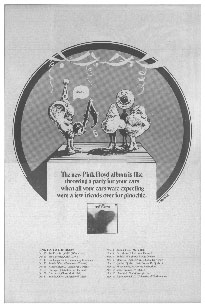![]()
  |

Meddle
Pink Floyd
Harvest 832
Released: October 1971
Chart Peak: #70
Weeks Charted: 73
Certified Gold: 10/29/73



 Pink Floyd has finally emerged from the Atom Heart Mother phase, a fairly stagnant period in their musical growth, marked by constant creative indecision. They tried to cover for it by putting a particular series of subliminal sound effects on the Atom Heart LP, and by dragging in huge, unwieldy brass orchestra sections to their concerts. Nothing short of disaster on both counts. Their new album, Meddle not only confirms lead guitarist David Gilmour's emergence as a real shaping force with the group, it states forcefully and accurately that the group is well into the growth track again.
Pink Floyd has finally emerged from the Atom Heart Mother phase, a fairly stagnant period in their musical growth, marked by constant creative indecision. They tried to cover for it by putting a particular series of subliminal sound effects on the Atom Heart LP, and by dragging in huge, unwieldy brass orchestra sections to their concerts. Nothing short of disaster on both counts. Their new album, Meddle not only confirms lead guitarist David Gilmour's emergence as a real shaping force with the group, it states forcefully and accurately that the group is well into the growth track again.
The first cut, "One Of These Days (I'm Going To Cut You Into Little Pieces)" sticks to the usual Floyd formula (sound effect -- slow organ build -- lead guitar surge & climax-resolving sound effect), but each segment of the tune is so well done, and the whole thing coheres so perfectly it comes across as a positive, high-energy opening. Next, we have a series of ozone ballads like "Pillow Of Winds" and "San Tropez." Pleasant little acoustic numbers hovering over a bizarre back-drop of weird sounds. A clever spoof entitled "Fearless" leads up to a classic crowd rendition of Rodger's & Hammerstein's "You'll Never Walk Alone," the perennial victory song for the Wembley Cup Final crowd in England. And, to round off side one, a great pseudo-spoof blues tune with David Gilmour's song Seamus taking over the lead "howl" duties.
 Click image for larger view. |
- Jean-Charles Costa, Rolling Stone, 1-6-72.
Bonus Reviews!
Pink Floyd has written and produced this sure-fire chart winner in their own unique style. LP features unusual sound effects, an entire side entitled "Echoes," the 30's-style "San Tropez" and a raunchy vocal workout on "Seamus." Heavy FM play a certainty.
- Billboard, 1972.
Among the novel accomplishments in their stormy yet highly successful careers, none looms larger than their score for the film, More. They are the only rock group, so far, to successfully integrate true music into the background of a film, and also have the music stand up as an album.
This is their first disk since the mammoth Atom Heart Mother suite released last February (their LP Relics, released some months ago, is a compilation of old tracks). And it certainly carries on the Floyd tradition. The opening, "One Of These Days," serves as in instrumental introduction to the softly hypnotic "A Pillow Of Winds," that drifts along on the cloud of Rick Wright's amazing electronic organ background and David Gilmour's facile multi-guitar sections.
"Fearless" is fascinating. It's an up-tempo number with a repeating, building guitar riff that merges, toward the end, with a crowd's chanting at the beginning of an unguessed sporting event.
The entire second side is taken up by "Echoes," a tone poem that allows all four group members much time to stretch their muscles. Yet not a moment is wasted and, as usual, the duets between Rick and David are superlative. The whole rises and falls on a continuing musical wave, as relentless and comforting as the Pacific's tide. This is another masterpiece by a masterful group.
- Ed Kelleher, Circus, 1-72.
This has got to be their best ever. Pink Floyd, in case you didn't know, is an original English band. Starting with an instrumental, "One of These Days," it contains probably the best, hardest guitar work they've done, mixed with the occasional weird sounds that they're famous for. "Seamus" is a nice slow blues but its all too short. "Fearless" is the best cut on the album -- a "softy" dealing with the same theme behind Rodgers and Hammerstein's "You'll Never Walk Alone." It's a nice tune with nice lyrics and finishes off, believe it or not, with the Liverpool soccer team's fight song!
Side two is only one song, "Echoes." It begins as a typical slow Floyd selection and then the band jams for a while (the organ here is exceptionally good). It ends with about ten minutes of strange bizarre sounds.
- Steve Peterson, Hit Parader, 7/73.
"Echoes" moves through 23:21 of "Across the Universe" cop with the timeless calm of interstellar overdrive, and the acoustic-type folk songs boast their very own melodies (as well as a real dog, rather than electronic seagulls, for sound effect). The word "behold" should never cross their filters again, but this is definitely an improvement: one eensy-weensy step for humanity, one giant step for Pink Floyd. B-
- Robert Christgau, Christgau's Record Guide, 1981.
The cult of Pink Floyd is bifurcated between those who still hold that Syd Barrett was English pop music's great post-Beatles genius and those who never heard of the mad Mr. Barrett but find his band's techno-spacey studio wizardry the realization of some cosmic window. In retrospect, the best of the group's music provides an ersatz soundtrack for sound nuts or space toddlers. Meddle preceded their classic Dark Side of the Moon by a couple of years, and its title track suggests the atmospherics that were finally fully realized on Dark Side, but it lacks the cohesiveness and structure that established the 1973 release as a multiyear best seller. The rest of the recording, with the possible exception of "One of These Days," is less than memorable. B-
- Bill Shapiro, Rock & Roll Review: A Guide to Good Rock on CD, 1991.
With Meddle, Pink Floyd instrumentally arrived at an airy ensemble sound, which would eventually find full flower on their 1973 classic Dark Side of the Moon. This approach is particularly evident on "Echoes," a periodically langourous jam that takes up one half of the album. Nevertheless, there are enough sonic concepts and pleasant melodies at work on this album to make it worthwhile to the Floyd fans looking to dig deeper than Dark Side of the Moon or The Wall. * * * *
- Rick Clark, The All-Music Guide to Rock, 1995.
Meddle captures Pink Floyd at a crucial, formative juncture just before their Dark Side of the Moon breakthrough. * * *
- Gary Graff, Musichound Rock: The Essential Album Guide, 1996.
![]() Reader's Comments
Reader's Comments
No comments so far, be the first to comment.